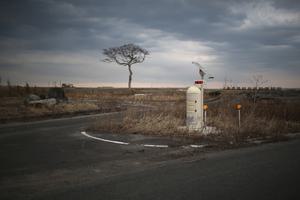Energy
-
With New Tools, A Focus On Urban Methane Leaks
Until recently, little was known about the extent of methane leaking from urban gas distribution pipes and its impact on global warming. But recent advances in detecting this potent greenhouse gas are pushing U.S. states to begin addressing this long-neglected problem.
-
Indonesian Coal Mining Boom Is Leaving Trail of Destruction
Since 2000, Indonesian coal production has increased five-fold to meet growing domestic demand for electricity and feed export markets in Asia. The intensive mining is leading to the clearing of rainforest and the pollution of rivers and rice paddies.
-
As the Fracking Boom Spreads, One Watershed Draws the Line
After spreading across Pennsylvania, fracking for natural gas has run into government bans in the Delaware River watershed. The basins of the Delaware and nearby Susquehanna River offer a sharp contrast between what happens in places that allow fracking and those that do not.
-
Undamming Rivers: A Chance For New Clean Energy Source
Many hydroelectric dams produce modest amounts of power yet do enormous damage to rivers and fish populations. Why not take down these aging structures, build solar farms in the drained reservoirs, and restore the natural ecology of the rivers?
-
Beyond the Perfect Drought: California’s Real Water Crisis
The record-breaking drought in California is not chiefly the result of low precipitation. Three factors — rising temperatures, groundwater depletion, and a shrinking Colorado River — mean the most populous U.S. state will face decades of water shortages and must adapt.
-
Despite Hurdles, Solar Power in Australia Is Too Robust to Kill
No nation has as high a penetration of residential solar as Australia, with one in five homes now powered by the sun. And while the government has slashed incentives, solar energy continues to grow, thanks to a steep drop in the cost of PV panels and the country’s abundant sunshine.
-
Oil Drilling in Arctic Ocean: A Push into Uncharted Waters
As the U.S. and Russia take the first steps to drill for oil and gas in the Arctic Ocean, experts say the harsh climate, icy seas, and lack of infrastructure means a sizeable oil spill would be very difficult to clean up and could cause extensive environmental damage.
-
Surge in Renewables Remakes California’s Energy Landscape
Thanks to favorable geography, innovative government policies, and businesses that see the benefits of clean energy investments, California is closing in on its goal of generating a third of its electricity from renewables by 2020.
-
Can the North Sea Wind Boom And Seabird Colonies Coexist?
Offshore wind farms have been proliferating in the North Sea, with more huge projects planned. But conservationists are concerned this clean energy source could threaten seabird colonies that now thrive in the sea’s shallow waters.
-
Oklahoma’s Clear Link Between Earthquakes and Energy Boom
Oklahoma officials this week said oil and gas activity was the likely cause of the stunning increase in earthquakes in the state. In an interview with Yale Environment 360, Oklahoma geologist Todd Halihan talks about what has caused this growing problem and what can be done about it.
-
How Conservative Texas Took The Lead in U.S. Wind Power
Innovative government policies have helped propel Texas into the forefront of wind energy generation in the U.S. But the main impetus for the Lone Star State’s flourishing wind sector is the revenue it has generated for landowners and local communities.
-
Frustrated Tar Sands Industry Looks for Arctic Export Route
With the Keystone XL and other pipeline projects running into stiff opposition, Alberta’s tar sands industry is facing growing pressure to find ways to get its oil to market. One option under consideration would be to ship the oil via an increasingly ice-free Arctic Ocean.
-
Why This Tea Party Leader Is Seeing Green on Solar Energy
As a founder of the Tea Party movement, Debbie Dooley may be an unlikely advocate for renewable energy. But in an e360 interview, she explains why she is breaking ranks with fellow conservatives and promoting a Florida ballot initiative that would allow homeowners to sell power produced by rooftop solar.
-
On the River Nile, a Move to Avert a Conflict Over Water
Ethiopia’s plans to build Africa’s largest hydroelectric dam on the Nile have sparked tensions with Egypt, which depends on the river to irrigate its arid land. But after years of tensions, an international agreement to share the Nile’s waters may be in sight.
-
Why U.S. East Coast Should Stay Off-Limits to Oil Drilling
It’s not just the potential for a catastrophic spill that makes President Obama’s proposal to open Atlantic Ocean waters to oil exploration such a bad idea. What’s worse is the cumulative impact on coastal ecosystems that an active oil industry would bring.
-
Will New Obstacles Dim Hawaii’s Solar Power Surge?
Blessed with lots of sun and keen to cut its reliance on imported oil, Hawaii has moved to the forefront of residential solar installations in the U.S. But financial and technical hurdles are slowing the state’s drive to generate 40 percent of its electricity from renewable energy by 2030.
-
Natural Gas Boom Brings Major Growth for U.S. Chemical Plants
The surge in U.S. production of shale gas is leading to the rapid expansion of chemical and manufacturing plants that use the gas as feedstock. But environmentalists worry these new facilities will bring further harm to industrialized regions already bearing a heavy pollution burden.
-
Could Global Tide Be Starting To Turn Against Fossil Fuels?
From an oil chill in the financial world to the recent U.S.-China agreement on climate change, recent developments are raising a question that might once have been considered unthinkable: Could this be the beginning of a long, steady decline for the oil and coal industries?


